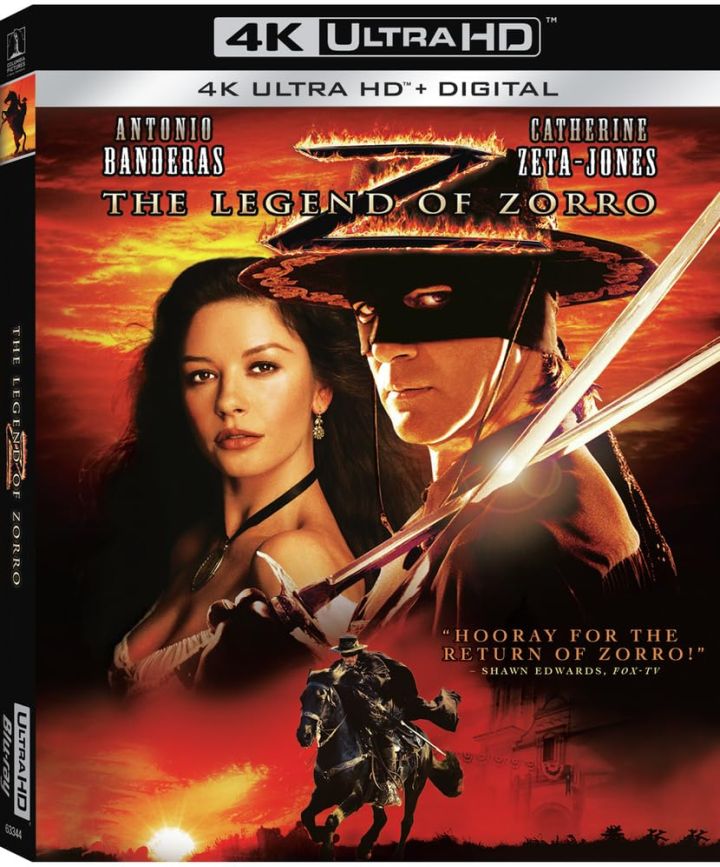
The Mask of Zorro (1998), while not a perfect movie, had a near-perfect sense of tone, and fantastic casting. Antonio Banderas can be suave, he can be goofy, he can be dangerous. In that film, his journey from petty criminal to over-eager vigilante to sophisticated California Don took advantage of all his skills. Catherine Zeta-Jones was beyond beautiful and capable as the daughter of his rival, and his eventual lover.
Director Martin Campbell (GoldenEye, Casino Royale) knew how close to camp he could push the story without going over into parody. The Mask of Zorro has an emotional core, worthy villains, and exciting action. The plot is not much to write home about, but while watching it, who cares?
The follow-up, The Legend of Zorro (2005), seems a little late in coming, but when it re-unites the principals and the director. So, it ought to bring back the magic as well. Right? Sadly, Legend does every mediocre thing that a sequel can do, and piles on some extra cinematic sins to boot.
First, it erases Don Alejandro’s (the alter ego of Zorro) entire character arc. He went from a slob to a convincing aristocrat in the first film. Here, one (rather major) setback and he becomes a slob again. He’s a drunk, a pathetic reject, and a deadbeat dad in one fell swoop. Just as disastrously, it turns Zeta-Jones Elana into an irritating scold. See, she doesn’t want Alejandro to be Zorro anymore. Because it’s dangerous.
It’s a typical, and thankless, role to place a female character into: the killjoy. What’s worse is the movie tonally implies that she’s right, and he’s being selfish living his life of “adventure” (read: putting his life on the line to protect the poor people of California). To imply that being Zorro is selfish and destructive is not the best chord to sound in a Zorro movie.
So, unexpectedly, she sends him a divorce notice. I do not expect any kind of perfect historical fidelity in pulp stories. But even with my rudimentary knowledge of 19th century Catholicism, I’m pretty sure divorce took a hell of a lot more than some paperwork. It’s just one of the many minor and major plot points that depends on the audience not paying attention, or caring.
Elana takes up with an old friend of hers, Frenchman Armand (Rufus Sewell), in one of the better performances in a fairly dismally acted film. Alejandro is of course convinced that he is up to no good (no points for guessing he’s right). He thinks he’s working with the reprehensible McGivens, an outlaw with a cross-shaped scar on his face and a very vocal and completely tone-deaf racist animus against Mexicans and, weirdly, Frenchmen.
McGivens (well played by an unrecognizable Nick Chinlund) is one of the characters the feels like he came from an earlier, darker draft of the screenplay. He doesn’t fit in well with a movie where considerable screen-time is taken up by Zorro’s young son, Joaquin, who engages in daring do of his own. Joaquin’s antics would fit in in a children’s movie. But it’s irritating to watch a kid best two adults in combat. When Zorro takes over the fight, there’s no tension. If a kid can upstage them, of course Zorro can.
The Legend of Zorro is strange because it is reluctant to allow Zorro to take center stage. His son, who doesn’t know his dad’s alter ego, has to be a swordfighter, horseman, and acrobat, too. His wife (sorry, ex-wife) has to be almost as capable as he is, and even save him physically several times. Hell, even his priest is an excellent hand to hand fighter. With all these tough people around, who the hell needs Zorro?
Some of the action sequences are passable. Some of the sword fights are fun (though never at the level of invention of the earlier film.) But there’s no heart at the center of the film. We’re supposed to want Alejando and Elana to get back together. That’s the emotional drive at the movie. But somewhere between Mask and Legend, the actors’ chemistry evaporated. They aren’t any fun when they’re together, why should we want them re-united?
The film has some decent imagery. The finale on a train with a horse is memorable. Unfortunately, they’re not rendered particularly palatably on this new 4K release. There’s a dingy, undersaturated patina to the imagery that looks like it desperately needs remastering.
The Mask of Zorro was a fun throwback to pulp legends and dynamic physical action. The Legend of Zorro tries to replay the formula without advancing anything, and turns into an unattractive, sometimes unpleasant miasma. The characters don’t gel. Some of the action sequences are over-produced and lack grit. The story is murky, but specific enough that its historical inaccuracies are grating. In every way, this is a disappointing follow-up to a film that punched above its weight.
The Legend of Zorro has been released on 4K UHD and Blu-ray by Sony Pictures Home Entertainment. Extras include a commentary by the director and cinematographer. Video extras include 40 minutes of EPK featurettes: “Stunts”, “Playing with Trains”, “Armand’s Party”, and “Visual Effects”; and 11 minutes of deleted scenes. There are also some trailers.